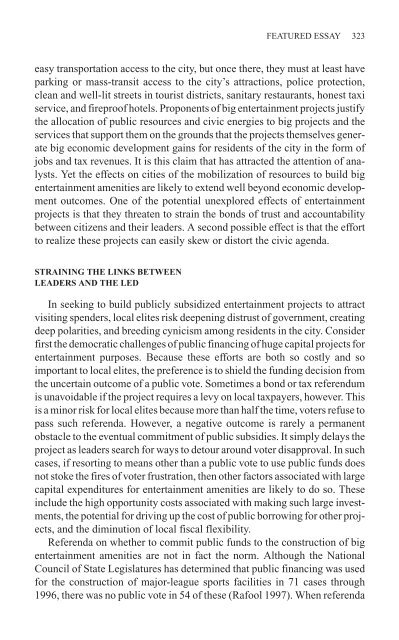Peter-Eisinger.-Politics-of-Bread-and-Circus
Peter-Eisinger.-Politics-of-Bread-and-Circus
Peter-Eisinger.-Politics-of-Bread-and-Circus
Create successful ePaper yourself
Turn your PDF publications into a flip-book with our unique Google optimized e-Paper software.
FEATURED ESSAY 323<br />
easy transportation access to the city, but once there, they must at least have<br />
parking or mass-transit access to the city’s attractions, police protection,<br />
clean <strong>and</strong> well-lit streets in tourist districts, sanitary restaurants, honest taxi<br />
service, <strong>and</strong> firepro<strong>of</strong> hotels. Proponents <strong>of</strong> big entertainment projects justify<br />
the allocation <strong>of</strong> public resources <strong>and</strong> civic energies to big projects <strong>and</strong> the<br />
services that support them on the grounds that the projects themselves generate<br />
big economic development gains for residents <strong>of</strong> the city in the form <strong>of</strong><br />
jobs <strong>and</strong> tax revenues. It is this claim that has attracted the attention <strong>of</strong> analysts.<br />
Yet the effects on cities <strong>of</strong> the mobilization <strong>of</strong> resources to build big<br />
entertainment amenities are likely to extend well beyond economic development<br />
outcomes. One <strong>of</strong> the potential unexplored effects <strong>of</strong> entertainment<br />
projects is that they threaten to strain the bonds <strong>of</strong> trust <strong>and</strong> accountability<br />
between citizens <strong>and</strong> their leaders. A second possible effect is that the effort<br />
to realize these projects can easily skew or distort the civic agenda.<br />
STRAINING THE LINKS BETWEEN<br />
LEADERS AND THE LED<br />
In seeking to build publicly subsidized entertainment projects to attract<br />
visiting spenders, local elites risk deepening distrust <strong>of</strong> government, creating<br />
deep polarities, <strong>and</strong> breeding cynicism among residents in the city. Consider<br />
first the democratic challenges <strong>of</strong> public financing <strong>of</strong> huge capital projects for<br />
entertainment purposes. Because these efforts are both so costly <strong>and</strong> so<br />
important to local elites, the preference is to shield the funding decision from<br />
the uncertain outcome <strong>of</strong> a public vote. Sometimes a bond or tax referendum<br />
is unavoidable if the project requires a levy on local taxpayers, however. This<br />
is a minor risk for local elites because more than half the time, voters refuse to<br />
pass such referenda. However, a negative outcome is rarely a permanent<br />
obstacle to the eventual commitment <strong>of</strong> public subsidies. It simply delays the<br />
project as leaders search for ways to detour around voter disapproval. In such<br />
cases, if resorting to means other than a public vote to use public funds does<br />
not stoke the fires <strong>of</strong> voter frustration, then other factors associated with large<br />
capital expenditures for entertainment amenities are likely to do so. These<br />
include the high opportunity costs associated with making such large investments,<br />
the potential for driving up the cost <strong>of</strong> public borrowing for other projects,<br />
<strong>and</strong> the diminution <strong>of</strong> local fiscal flexibility.<br />
Referenda on whether to commit public funds to the construction <strong>of</strong> big<br />
entertainment amenities are not in fact the norm. Although the National<br />
Council <strong>of</strong> State Legislatures has determined that public financing was used<br />
for the construction <strong>of</strong> major-league sports facilities in 71 cases through<br />
1996, there was no public vote in 54 <strong>of</strong> these (Rafool 1997). When referenda


